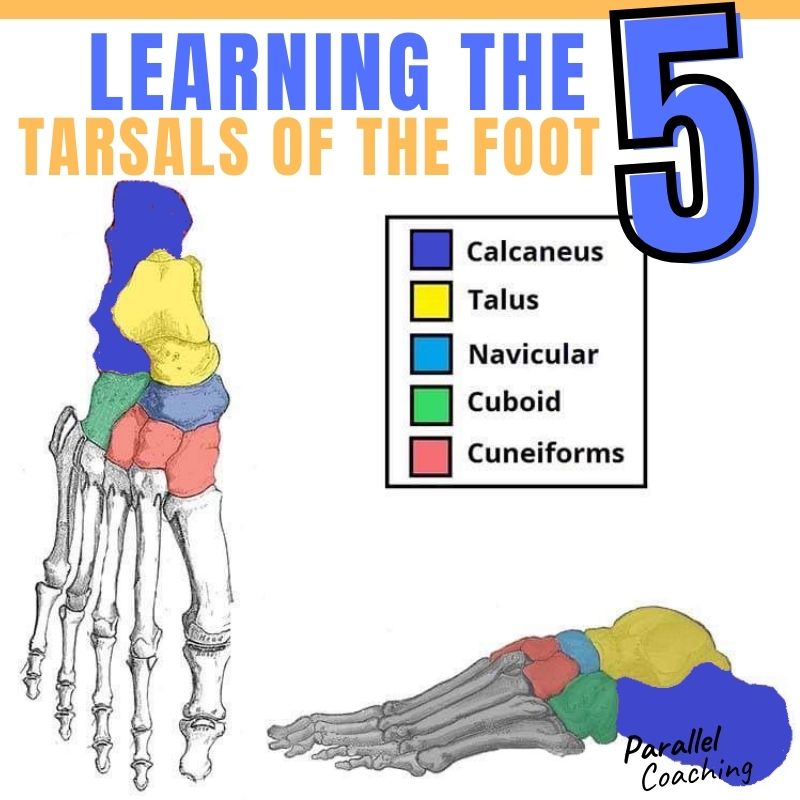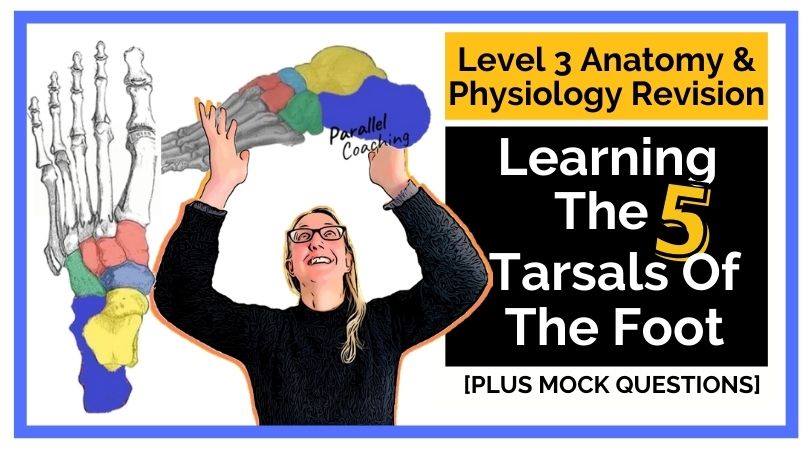In today’s blog, you’ll learn the 5 tarsals of the foot and understand how they work together to allow movement and stability of the foot
You’ll discover:
- What are tarsals
- Which 5 bones make up the tarsals of the foot
- The names of all 5 Tarsals Of The Foot
- Mock questions to test your knowledge
- How to learn and remember complex anatomy
What are Tarsals?
Tarsals are the small cube-shaped bones that make up the rearfoot and ankle.
They are “short-bones” which means they are:
- Strong
- Stable
- Allow for small amounts of movement
Which 5 bones make up the tarsals of the foot?

The Calcaneus
Otherwise known as your Heel Bone, Its main function is to dissipate impact from walking gait patterns. It’s irregular shape allows for important attachment sites of muscles (like the gastrocnemius via the Achilles tendon)
The Talus
This sits on top of the calcaneus and allows for articulation with the Tibia to create movement at the ankle.
The Navicular
This is a boat-shaped bone located in the top inner side of the foot. It helps connect the talus to the cuneiform bones of the foot and creates a longitudinal arch.
The Cuboid
The cuboid helps provide for the stability of the foot and the movement of the toes, and is on the lateral edge of the foot. It plays a big role in ensuring proper weight distribution and flexibility along the plantar fascia that runs along the sole of the foot.
The Cuneiforms
There are three of these on each foot. Its irregular shape allows for important attachment sites of muscles (like the gastrocnemius via the Achilles tendon) boney part of the first metatarsal leaves the floor.
How to learn and remember complex anatomy
If you currently rely on just reading to revise and learn, you’ll be amazed a how quickly you remember your A&P when you start applying it/drawing it on you.
BECOME PART OF YOUR REVISION
At the end of the day you get to take “YOU” into the exam.
Linking your body to your revision is kinda like taking a load of notes into your exam. It makes it easier to remember and recall key information on exam day
Test your knowledge with today’s tarsals questions:
[NOTE: The answers are below the 3rd questions]
1. Which Tarsal articulates with the Tibia to form the ankle joint?
A. Tibia
B. Cuboid
C. Calcaneus
D. Talus
2. What anatomical name is given to the “heel bone”?
A. Talus
B. Calcaneus
C. Achilles heel
D. Cuboid
3. Which tarsal articulates with the first metatarsal?
A. Navicular
B. Cuneiforms
C. Cuboid
D. Calcaneus
What’s the CORRECT answer?
Answers to the mock questions are :
Question 1= D, Question 2 = B, Question 3 = B
If you want more mock questions like this, then you can download more Free Mock Questions: DOWNLOAD NOW
Need More Help with your Anatomy Exam Revision?
Discover How 6500+ Fitpros In Training Are Walking Into Their Exam With Confidence And Guaranteeing A Pass
Are you tired of staring at your manual and not knowing where to start?
Our revision mastery bootcamp breaks everything down into a clear and easy to follow structure.
You can download the videos to MP3 and MP4 to slice your revision time in half and finally understand the key principles of exercise.
This is not another course with more exams – it HELPS pass the course you’re already enrolled on!
“EVERYTHING You Need To Learn, Revise And Pass Your Fitness Exam”
If you want to get your revision structured, learn everything you need to know and feel confident on exam day, then click the link below:
https://revision.parallelcoaching.co.uk/fitness-exam-revision-courses

Dedicated to More
Hayley “The 5 Tarsals Of The Foot” Bergman
Parallel Coaching
P.S. You can also find us on the following platforms:
Instagram: https://www.instagram.com/parallelcoaching
Facebook: https://www.facebook.com/ParallelCoaching
Twitter: https://twitter.com/ParallelCoach
YouTube: http://bit.ly/2F1Z1bs
More Anatomy Revision Blogs: HERE

